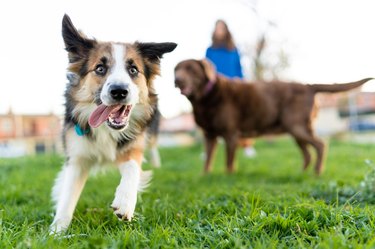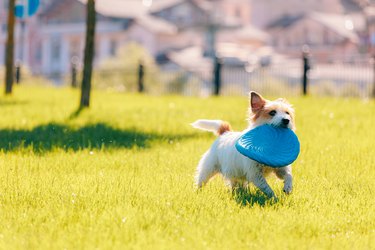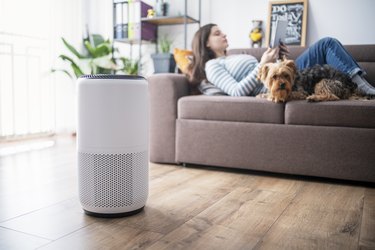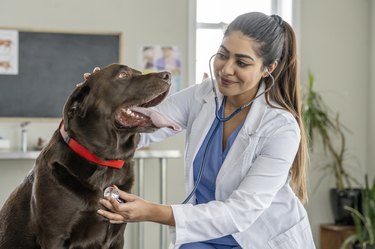Kennel cough is a common pet health issue. It gets its name because dogs in kennels often come down with the condition since it is highly contagious and easily transmitted. If your dog will be around other dogs in any situation, they should get the kennel cough vaccine, also known as the Bordetella vaccine. While there are things you can do at home to alleviate symptoms, your veterinarian should advise you on how to treat kennel cough.

Video of the Day
What is kennel cough?
Kennel cough is infectious tracheobronchitis that can easily be passed among dogs. While it's highly treatable, it can be more serious in young puppies with a weaker immune system. With a dog of any age, it's important to report any coughing to your veterinarian because it can also be a sign of a more serious disease. Canine influenza, heartworms, and canine distemper may all be reasons for a dog coughing.
Video of the Day
Most cases of kennel cough are caused by the bacterium Bordetella, which the Bordetella vaccine prevents. However, kennel cough can also be caused by canine adenovirus type 2, and canine parainfluenza virus. Canine respiratory coronavirus and mycoplasma can also cause respiratory infections in dogs. The kennel cough vaccine doesn't prevent a dog from getting an infection when coronavirus or mycoplasmas are the culprit. Also, there are kennel cough vaccines that are just for Bordetella and combination vaccines that are for Bordetella, canine adenovirus-2, and canine parainfluenza.

Common symptoms of kennel cough
If you notice any coughing or other changes in your dog, schedule an appointment with your veterinarian to get a diagnosis. Signs of kennel cough include:
- "Honking" cough
- Retching after coughing
- Runny nose or sneezing
- Lethargy
- Loss of appetite
- Mild fever
Causes of kennel cough in dogs
Kennel cough can be bacterial or viral. The illness is spread through:
- Direct contact with an infected dog
- Airborne droplets
- Surfaces like water bowls and food bowls
Dogs can pick up kennel cough in any setting where there are multiple dogs, such as:
- Kennels
- Groomers
- Doggie day care
- Dog parks
- Training groups
- Dog shows

How to treat kennel cough
Kennel cough treatment typically involves a week or two of rest. If your dog is coughing, consult your veterinarian for a diagnosis and the best treatment plan. They may prescribe antibiotics to alleviate symptoms and prevent secondary infection.
Monitor your dog's condition. Although kennel cough often clears up on its own, in some cases, it could get worse. The bronchitis could end up turning into pneumonia. If your dog shows symptoms of fever, wheezing, or loss of appetite, contact your veterinarian to make sure the cough has not progressed into a more serious condition.
If your dog has kennel cough, there are some measures you can try while they recover. While these aren't home remedies that cure kennel cough, they can help your dog stay more comfortable and avoid spreading the disease to other dogs.
1. Use a humidifier for dog cough
Moisture in the air can help your dog breathe easier and soothe their irritated respiratory tract. If you don't have a humidifier, you can have your dog sit in the bathroom twice a day after running hot water in the shower. This does not mean putting your dog in the actual shower!
2. Quarantine your dog
If you have more than one dog, you should keep the infected dog separate from healthy dogs so they don't also become infected. The Bordetella bacteria can live on surfaces for about 48 hours, so disinfect where necessary.
3. Look into supplements or medications
You might want to talk with your veterinarian about vitamin supplements. If your veterinarian prescribes a cough suppressant, though, be sure to use exactly what they prescribe and avoid human over-the-counter cough suppressants.
4. Avoid smoking around your pet
We all know that smoking isn't good for us, and it's not good for your pets either. A dog with kennel cough certainly does not need to be breathing in secondhand smoke. Their respiratory tract is irritated enough. Give your dog a break and don't smoke. Also avoid candles and vaping.
5. Take your dog for a slow walk
Relaxed walks in the fresh air may help if the temperature is mild. However, you'll want to keep rigorous activity to a minimum. When going for walks, use a harness instead of a collar to avoid irritation of the trachea.

How to prevent kennel cough in dogs
It is true that prevention is always the best medicine. Most veterinarians will recommend the Bordetella vaccine for all dogs. You can take other precautions, such as avoiding situations where your dog will be around a lot of other dogs, particularly without your supervision. You might have a friend dog sit when you're away rather than boarding your dog at a kennel. Almost all kennels, though, now require dogs to be vaccinated before boarding.
The bottom line
Kennel cough in dogs is easily prevented and usually easily treated. In addition to ensuring your dog gets the Bordetella vaccine, you can limit situations where your dog is with multiple other dogs in unsupervised situations. If your dog does exhibit a honking cough or a hacking cough, it's best to seek care from your DVM (veterinarian) to rule out other conditions and develop a treatment plan.